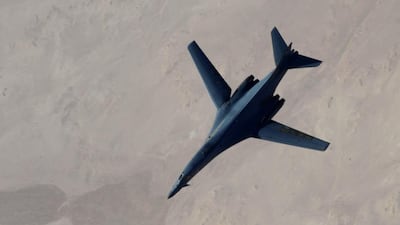Lessons from the Kosovo War need to be kept in mind by the coalition fighting in Iraq and Syria
While the US-led coalition's operations against ISIL in places like Kobani continue to depend overwhelmingly on air strikes, it is difficult not to draw comparisons to the last military campaign to rely on that tactic. Nato's 78-day bombardment of the Federal Republic of Yugoslavia forces during the Kosovo War in 1999 was ultimately successful, but it also demonstrated the limitations of air power.
There are several parallels with the fight against ISIL, not least being the warnings – then and now – from military strategists that air power alone would not achieve their goals. Each time, there was a deep reluctance on the part of the international coalitions involved to put boots on the ground.
One factor that emerged after the end of hostilities is that Nato’s claim to have destroyed half the Yugoslav Army’s 300 tanks deployed in Kosovo proved to be wildly overoptimistic. A report by the Rand Corporation, a nonprofit global policy think tank formed to offer research and analysis to the United States armed forces, said UN peacekeeping troops found the remains of only three tanks in Kosovo, while Yugoslav forces admitted withdrawing 10 more damaged tanks from the region. The leaders of Yugoslav forces later boasted about staying ahead of Nato by creating hundreds of dummy tanks while hiding the real ones.
The distinctions between events in 1999 then and today in Iraq and Syria are equally telling. Nato was fighting, in effect, the government of a modern and industrialised country, allowing it to exert pressure by bombing infrastructure assets like bridges, utilities, communication facilities, factories and similar large undisguisable assets. The guerrilla nature of ISIL’s forces do not offer such targets.
How ought a sober analysis of events in the Balkans 15 years ago influence the decisions made now in the campaign against ISIL? A start will be to acknowledge the limits of air power, which tend to be inefficient at destroying the military capability of guerrilla forces on the ground. For the coalition battling ISIL, care must be taken to avoid having to relearn the lessons of Kosovo.

